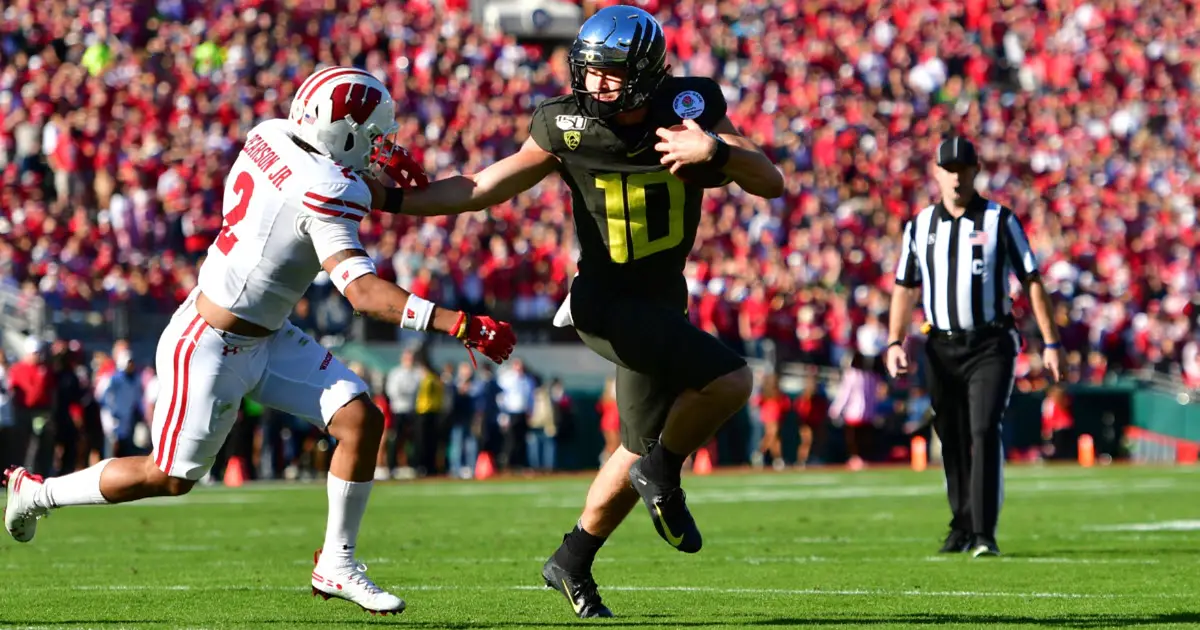By almost all metrics, Oregon shouldn’t have walked out of Pasadena with a victory. They had 118 fewer yards, 21 fewer plays and almost 17 fewer minutes of possession time than Wisconsin. The Badgers ran for 70 yards more than the Ducks.
But metrics don’t really tell the story of a football game, and the Ducks didn’t lose.
Turnovers
Justin Herbert threw an interception on the opening play of Oregon’s second drive of the game. It came after a Wisconsin kickoff return for a touchdown tied the game 7-7, and suddenly the Ducks looked like they were in trouble. The Badgers only came away with three points on the drive, but Oregon quickly lost the momentum gained on their opening drive of the game.
That was the last Oregon turnover of the Rose Bowl.
Wisconsin would go on to turn the ball over four times, giving up three fumbles and an interception. The turnovers would prove deadly, as the Ducks scored 21 of their 28 points off of the four takeaways.
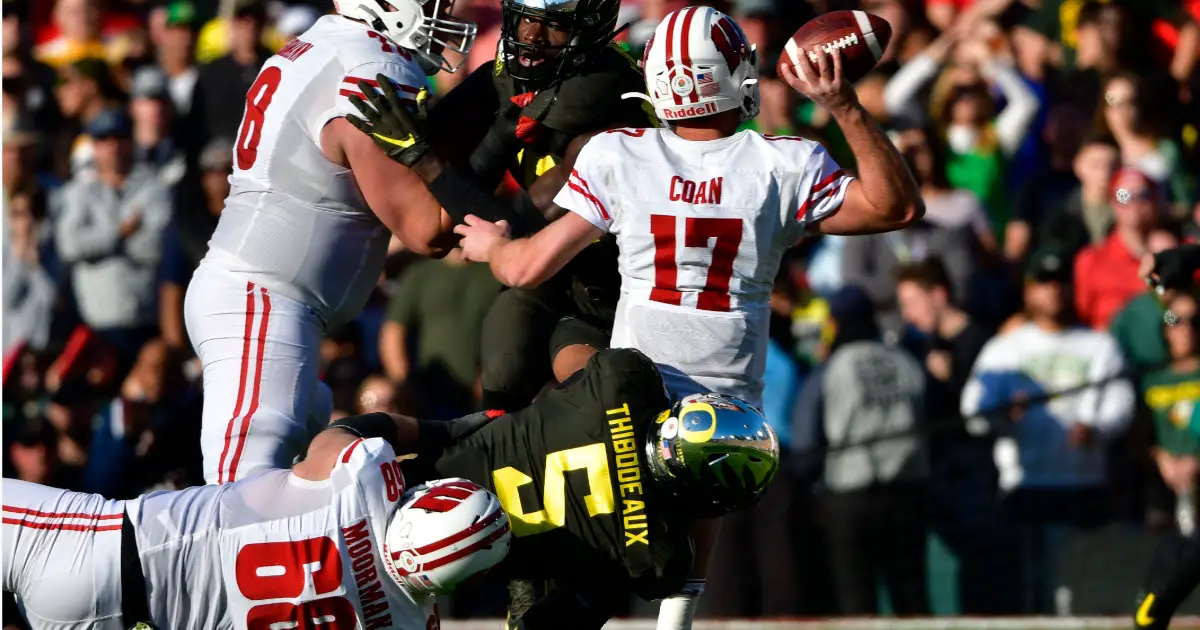
So Kayvon Thibodeaux (No. 5) is the one being tackled?
A special teams turnover in the third quarter was especially costly, as Brady Breeze recovered a fumbled snap on a punt and ran it in for a touchdown. The touchdown was the only Duck score of the quarter and put Oregon in position to score the game-winning touchdown. Breeze also forced a fumble on an end-around in the fourth quarter, stalling the Wisconsin momentum and leading to what would be the Ducks’ game-winning drive.
Herbert Scores
Oregon had three offensive scores in the Rose Bowl. All three scores were runs by Herbert. The senior QB didn’t get a lot of chances to throw the ball, and CJ Verdell was held in check for the most part. So Herbert took the game into his hands and carried the ball until Oregon won the game. All three touchdowns featured a stiff arm as Herbert hit the edge, and Herbert used speed that went underutilized throughout his career to pull away from defensive backs.
Herbert’s three rushing touchdowns were the most by a quarterback in the Rose Bowl since 2006 and the most by a Ducks QB since 2014. The senior had only one rushing score on the season prior to the Rose Bowl, and the added wrinkle in the offense was one of the key differences in the game.
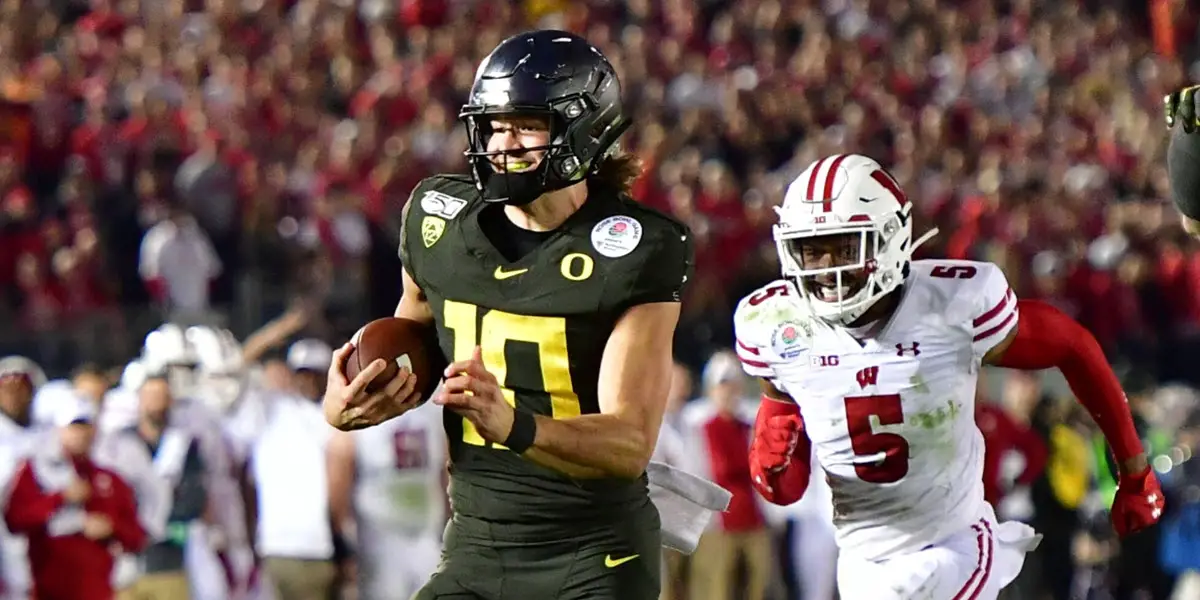
Herbert’s jets for the third TD surprised everyone…
Penalties
After taking a step back as a team in 2019, Oregon cleaned up their penalty yards to start 2020. Having only two penalties in the game, the Duck’s showed more discipline than they had at several times throughout the season. Wisconsin, on the other hand, had nine fouls called in the game. A key offensive pass interference call in the fourth quarter likely sealed the game.
The nine penalties called on Wisconsin were uncharacteristic of the team, which typically plays very disciplined football. The Badgers had several false start and off-sides penalties called, leading to shorter fields for the Ducks and longer fields for themselves.
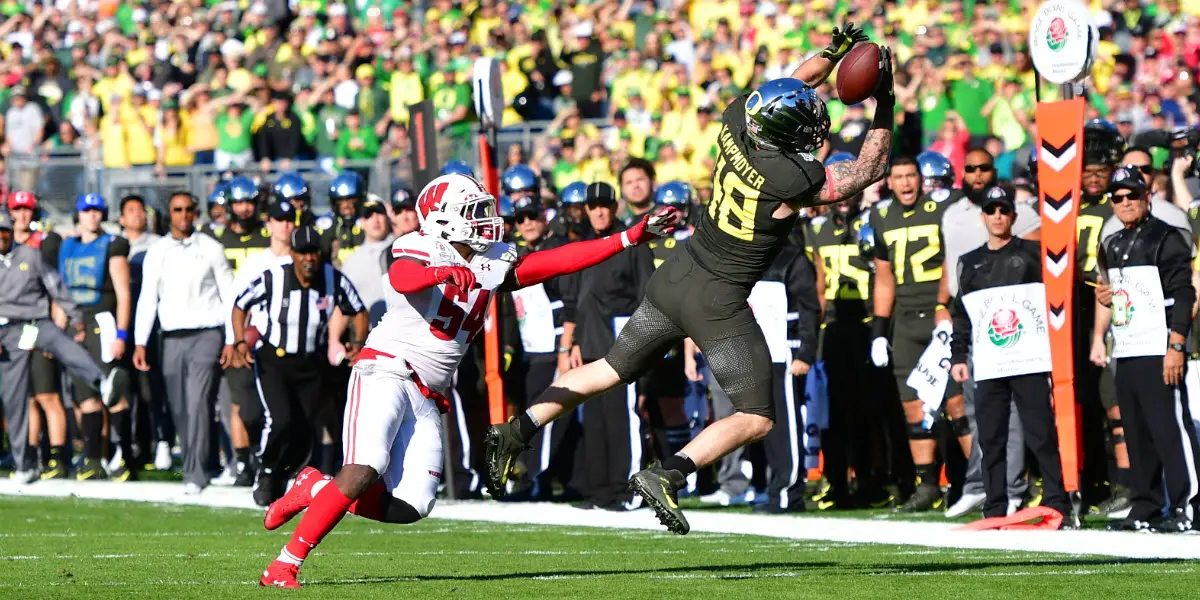
Using the Tight End (Hunter Kampmoyer No. 48) early in the game worked well.
Play-calling Issues
Marcus Arroyo’s tenure as offensive coordinator for the Oregon Ducks is officially over. He has moved on to being the head coach at UNLV. But Mario Cristobal allowed him to coach the Rose Bowl in order to keep stability for play-calling purposes. Unfortunately, the game was a microcosm of the entire Arroyo tenure at Oregon.
The Ducks looked sharp on their opening drive. They went 75 yards in 12 plays and Herbert scored the first of his three touchdowns. After that clearly scripted drive, however, Oregon’s offense then stalled, failing to gain a first down until there was 3:57 left in the second quarter. The Ducks’ offense had only 204 yards in the game, well below their season average. After their first of the game, the Ducks failed to sustain a drive for more than three minutes.
Many of the struggles were caused by a truly elite Wisconsin defense. They routinely forced three-and-outs from the Oregon offense and kept the Ducks’ defense on the field. Some of the blame, however, should be placed on the play-calling. Herbert did not throw the ball downfield consistently, and Arroyo routinely called designed runs up the middle against eight- and nine-man boxes. While Wisconsin forced the Ducks into difficult situations, the coaching staff did little to help the offense.
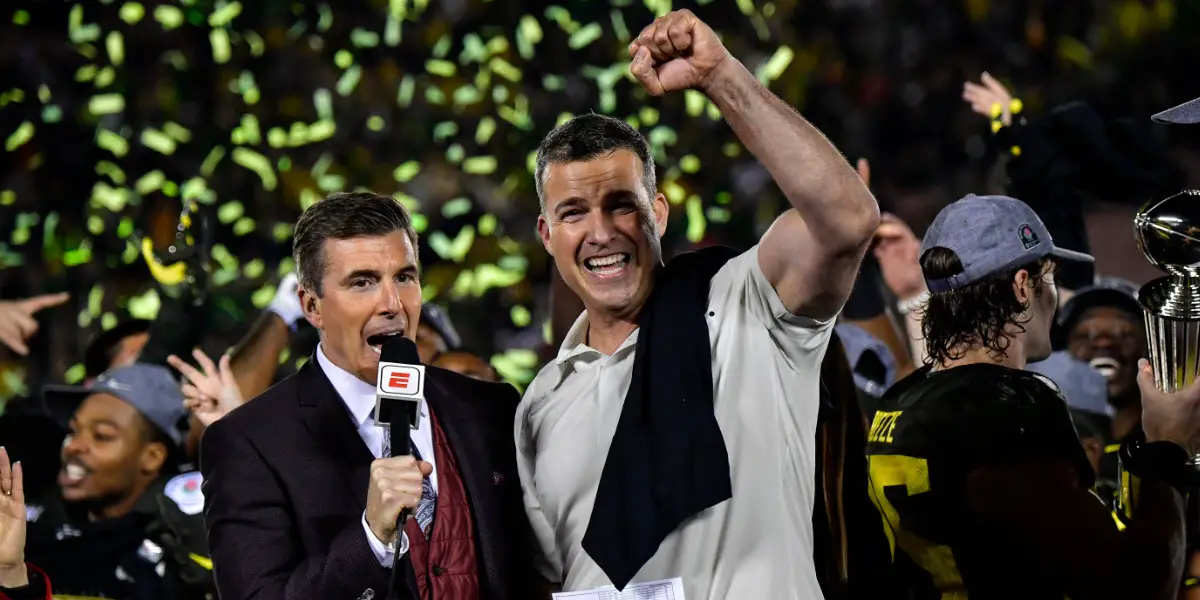
Coach Mario Cristobal shares the feelings of all Duck fans!
The Ducks Win
Despite the unfavorable metrics, Oregon walked away Rose Bowl champions. The defense played a mostly great game, holding Jonathan Taylor to a modest 94 yards on a 4.5 yard average. The kick coverage team was downright awful in the first half, giving up a touchdown and a second long return, but shored up their deficiencies at halftime and didn’t break their containment in the second half.
Cristobal was elated in the post game interviews, and the players took over an hour to vacate the field. This win means a lot to the team, the staff and the fan-base. Herbert spoke post-game as well, saying that winning the Rose Bowl was the best feeling he had ever experienced.
The team probably agrees.
Ryan Robertson
Yuma, Arizona Top Photo Credit: Tom Corno
 Phil Anderson, the FishDuck.com Volunteer editor for this article, is a trial lawyer in Bend Oregon.
Phil Anderson, the FishDuck.com Volunteer editor for this article, is a trial lawyer in Bend Oregon.
Related Articles:
Why Oregon Football Always Belongs in the National Conversation
The B1G Won the 2026 Coaching Carousel...Big-Time!
Continuity? Lanning's Hiring Success is Put to the Test
Why Whether Dyer Was Down or Not...Doesn't Matter
How to Analyze Football Talent Like a Pro
Some Thoughts as the Football Withdrawals Kick In
Ryan Robertson is a defense contractor for the United States Marine Corps. A lifelong Duck fan from Grants Pass, he joined the Army out of high school. After four years as an Intelligence Analyst he decided it was time to further his education and pay more attention to his Ducks. One of Ryan’s first memories is of watching the Ducks, led by Joey Harrington, beating up on the Utah Utes in 2001. His grandfather ran track at Oregon in the ‘50s. He loves the Ducks, and has a passionate interest in reading every scrap of analysis centered around the football team.

